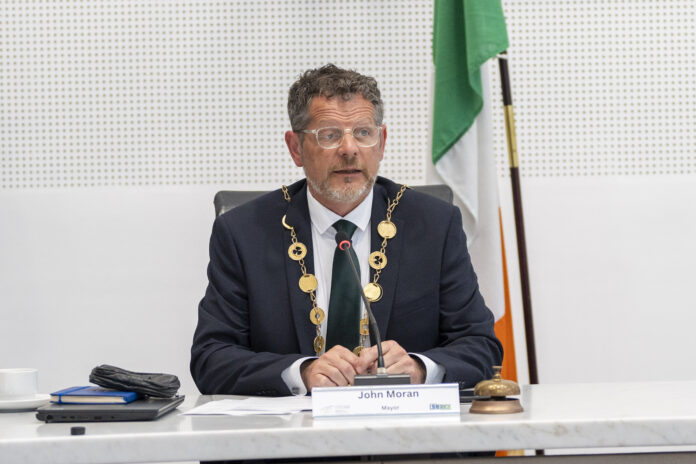
SERIOUS structural problems which have been building up for years in the budget of Limerick City and County Council can no longer be ignored.
This was the stark message to Council members from Mayor John Moran at the opening of last Friday’s 2026 Budget meeting.
The draft Annual Budget for 2026, he said, was prepared in very difficult circumstances for the Council, leaving tough choices to be made by elected members.
Mayor Moran thank councillors who earlier this summer took the tough decision of maximising the income from Local Property Tax to protect core services. This, he revealed, clearly helps, “but is not enough on its own”.
“I wish it were otherwise, but we are where we are and we have to face up to that reality,” the Mayor said at the top of the meeting.
“There is no one coming to bail us out and what I am proposing is what needs to be done to move forward at a minimum through 2026. The sad reality is that unless we find ways to make things change for the better, for example convincing national government that it can no longer continue to underfund local government, even if we find ways to achieve a balance budget today, we will be faced with even more stark choices for 2027,” he warned.
“This is the crossroads at which we stand. We can decide to struggle again through just another budget and come back again next year to stare down at even greater problems facing us, or we can use this year wisely to make significant changes in how we operate, how we finance ourselves, and how we provide critical services to the people we serve.”
“It will not be easy,” he said. “But if I do not sound this warning this year, while we still have time, I would not be doing my job.”
Mayor Moran, who once helped steer the country’s financial recovery as a senior bank supervisor at the Central Bank and as secretary general in the Department of Finance, believes Limerick has shown over the centuries how resilient it is.
“If we face the facts honestly and bravely, I believe it will allow us to set our own path forward together and do so in a way that allows us to contribute, not hinder, the forward march of Limerick over the rest of our Council term,” he told councillors.
“We have many vulnerable members of our communities – perhaps more than other local authorities – and, as their leadership, we owe it at least to them to secure a financial stability that avoids any decisions in the future which might mean not being able to serve them as we should.”
The Mayor cited increasing population as creating extra demand for core services. Inflation, he said, has continued to impact service delivery costs.
“On the face of it, we are making a significant increase in spending on core services of almost €35million. But while these significant increases in outgoings are scheduled for 2026, cost inflation is eating into the real quantum of delivery,” he confessed.
According to Mayor Moran, the reality is that, due to lack of sufficient increases in central government funding, and the impact of issues the Council knew were coming down the track, the local authority now finds itself having to take significant corrective measures to achieve a balanced budget.
The Mayor said that he did not like being the bearer of bad news as he announced that the Coucnil’s income excess over expenditure has consistently declined in recent years.
He deemed this a warning sign that things are getting worse year on year and will continue to do so unless something changes. This, he said, prevents the Council from continuing to put money aside to build up a safety net for “bad surprises in the future”.
“We have borrowed money along the way to carry out important works, but ones which are not producing income to repay those loans. That means when those loans need to be repaid, we have to find money somewhere else and, with no safety net fund, this means eating into the revenues which should be used for core services,” he said.
The Mayor added that “decisions were made that some of the cash we received, say from the repayment of the Troy studios loan, were not to be used to repay the original loans used to buy those studios but to for other purposes. This allowed us to carry out important maintenance works on our housing stock, but as we go into 2026 that cash
is all used up and we still have the maintenance to do for this year.”
He told councillors that “the safety net, which is reflected in our capital reserve number of €41million, is very much already accounted for. We are using the last available parts of that to help us for this year, but it is important to understand that this is not an option again next year.”
“Our Director of Finance has made it clear to me, and I agree with him, that it would not be responsible financially to dig deeper into that pot as it is already allocated to other legacy liabilities or commitments.”
Councillors were also informed that Budget 2026 will not fix the Council’s problems. The reality of the situation, the Mayor continued, will only buy the local authority enough time to make the changes it needs or there will be more difficult decisions to make next year.
“It might seem like we are being asked to make very hard decisions and that is true. But we need to understand that the seriousness of the underlying situation is such that these decisions are recommended to help us buy time to fully understand the underlying situation and develop and decide on our own multi-year corrective action plan,” he said.
“We need to do this early and together. I will be asking colleagues on the Corporate Policy Group and on the Audit Committee to start working quickly with me and the finance team so that we take advantage of the full year to work out what is best for Limerick and how we can find solutions to our underlying problems before a deteriorating financial situation requires us to cut core services.
“The future is in our hands but there is no longer time to dodge the real issues,” he concluded.
– Local Democracy Reporting Scheme


